The Vital Role of Pediatric Cardiologists in Children's Heart Care
Role of Pediatric Cardiologists
Pediatric cardiologists are medical specialists dedicated to diagnosing and treating heart problems in children, ranging from congenital heart defects to arrhythmias. Their expertise is crucial from fetal stages through young adulthood, addressing diverse heart conditions distinct from those typically seen in adults.
Specialized Training and Collaboration
These physicians undergo extensive training including medical school, pediatric residency, and a pediatric cardiology fellowship. They collaborate closely with pediatric heart surgeons, radiologists, anesthesiologists, and other healthcare professionals to deliver comprehensive, multidisciplinary care tailored to each child's unique needs.
Importance of Early Diagnosis
Early detection is essential for successful treatment and improved outcomes. Pediatric cardiologists use advanced diagnostic tools such as echocardiography, cardiac MRI, and genetic testing to identify heart defects early, sometimes even during pregnancy. Prompt diagnosis enables timely interventions including surgery or catheter-based treatments, helping prevent long-term complications.
Unique Nature of Children's Heart Conditions
Children’s heart conditions often differ from adults', with a higher prevalence of congenital defects rather than acquired diseases like heart attacks. Pediatric cardiologists understand these differences and design treatment plans that account for the child's growth and development, ensuring ongoing management and follow-up throughout childhood and beyond.
Early Detection and Diagnosis: Foundations for Effective Treatment
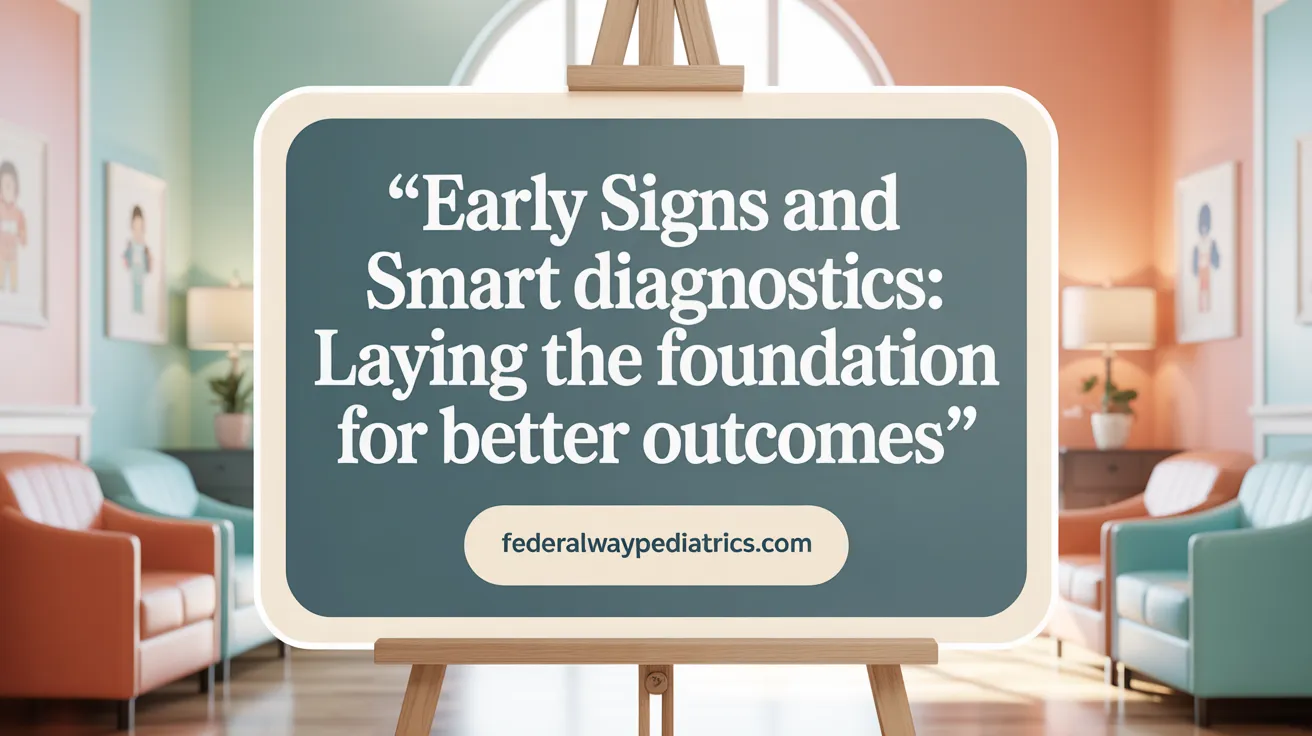
What Are Early Signs of Pediatric Heart Issues?
Parents and caregivers play a crucial role in recognizing early signs of pediatric cardiology issues that may indicate heart problems in children. Common symptoms include fatigue and poor feeding in children, cyanosis and breathing difficulties, rapid or difficult breathing, and inadequate growth. Other signs such as chest pain, dizziness, palpitations, and fainting may also prompt evaluation. Early recognition of these symptoms enables timely referral to a pediatric cardiologist for assessment.
Which Diagnostic Tools and Procedures Are Used?
Pediatric cardiologists employ a variety of advanced diagnostic tools in pediatric cardiology to accurately evaluate heart function and identify congenital or acquired heart conditions. These include:
- Echocardiography in children (including fetal echocardiography during pregnancy)
- Electrocardiogram (ECG/EKG)
- Cardiac MRI and CT scans
- Pulse oximetry test for heart defects
- Chest X-rays
- Cardiac catheterization procedure
- Genetic testing for heart conditions
These tests help define the nature and severity of heart defects and contribute to planning appropriate treatment.
How Does Care Span from Prenatal to Young Adulthood?
Specialized pediatric cardiology programs provide comprehensive care starting as early as prenatal cardiac diagnosis, sometimes identifying heart defects as early as 14 weeks gestation through fetal ultrasounds. This early detection allows for interventions before or shortly after birth when necessary.
Care continues through infancy, childhood, adolescence, and into young adulthood. Lifelong follow-up with a pediatric cardiologist is essential to monitor and manage congenital heart disease or acquired conditions. Facilities like Seattle Children’s Heart Center and Mary Bridge Children’s Hospital in Federal Way, Washington offer multidisciplinary teams ensuring seamless care transitions across developmental stages.
Why Is Early Intervention So Important?
Early diagnosis and treatment significantly improve outcomes for children with heart conditions. Certain congenital defects can be corrected through surgical and minimally invasive correction, preventing long-term complications. Early intervention allows for tailored treatment options for pediatric heart defects involving medications, catheter-based therapies, or surgery as required.
Timely management also helps optimize growth and development, reduce symptoms, and enhance quality of life. Collaborative care involving cardiologists, cardiac surgeons, and other specialists supported by family-centered lifestyle strategies ensures the best possible prognosis for pediatric patients with heart disease.
Comprehensive Care Approaches: From Diagnosis to Long-Term Management
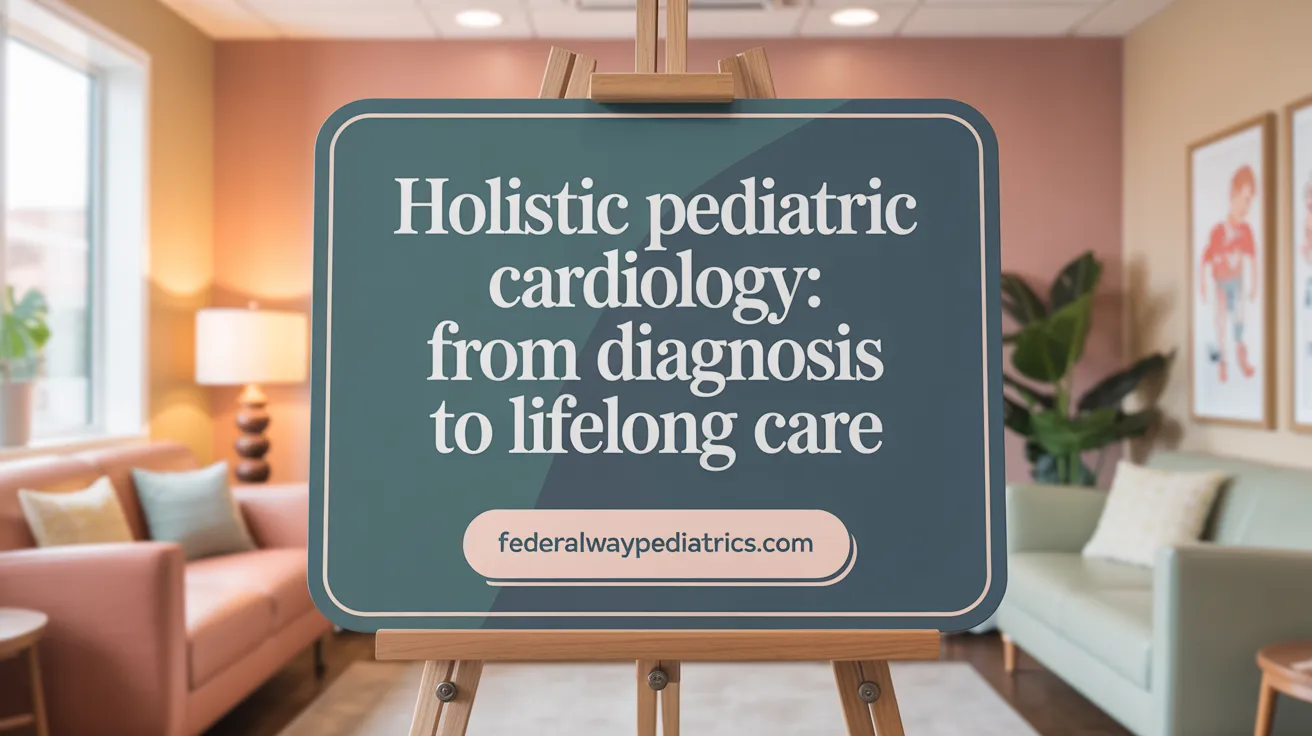
How Do Multidisciplinary Teams Enhance Pediatric Cardiology Care?
Pediatric cardiology care is best delivered through a multidisciplinary pediatric heart care teams approach. Pediatric cardiologists work closely with pediatric cardiac surgeons, anesthesiologists, nurses, radiologists, and other specialists to ensure a thorough evaluation and treatment plan.
This collaboration extends from early diagnosis, including prenatal fetal cardiac diagnosis, to long-term management into a child's young adulthood. Such teamwork allows for coordinated care tailored to each child's unique heart condition, whether congenital or acquired.
What Are the Treatment Options for Pediatric Heart Conditions?
Treatment strategies vary widely based on the type and severity of the heart condition:
- Regular Monitoring: Some minor congenital defects may resolve on their own or require watchful waiting.
- Medications: Used to manage symptoms and improve heart function in conditions like heart failure or arrhythmias.
- Catheter-Based Interventions: Minimally invasive procedures that repair defects such as holes in the heart or valve issues, part of catheterization and hybrid procedures.
- Surgical Interventions: Open-heart surgery is sometimes necessary for complex defects or when catheter-based options are not feasible, as described in surgical treatment for heart defects.
- Heart Transplant: Reserved for severe cases unresponsive to other treatments, with expert care information available at heart transplant support.
How Are Surgical and Catheter-Based Interventions Performed?
Interventions are increasingly advanced, with many centers employing hybrid techniques combining catheterization and surgery to minimize invasiveness. Cardiac catheterization laboratories perform hundreds of procedures annually, offering treatments such as septal defect closures and valve repairs without open-heart surgery.
Early diagnosis through sophisticated imaging tools, including echocardiography in children and cardiac MRI and CT scans, guides these interventions and helps optimize outcomes.
What Is the Role of Family-Centered Care in Treatment?
Family-centered care is fundamental in pediatric cardiology. Providers emphasize family support for pediatric heart disease through education, counseling, support groups, and child life services. This approach assists families in understanding complex health information and managing their child’s treatment journey.
Programs often incorporate preoperative tours for heart surgery and Sibling Support Centre to ease anxiety and promote emotional well-being.
What Support Resources Are Available to Families?
Children’s hospitals and pediatric cardiology clinics provide numerous resources:
- Support Groups: For patients and families to share experiences and coping strategies (Mary Bridge pediatric heart care).
- Diet and Lifestyle Guidance: Helping families promote 10 Ways to Keep Your Child's Heart Healthy.
- Community Outreach Clinics: Especially in rural and remote areas to ensure ongoing monitoring and access to expert care (Outreach cardiology teams).
- Transition Programs: To assist adolescents as they move from pediatric to adult health services (transition programs for adolescents with congenital heart disease).
Together, these comprehensive services ensure children with heart conditions receive not only advanced medical treatments but also holistic support that addresses emotional and developmental needs.
Cultivating Heart-Healthy Habits: Family and Community Roles
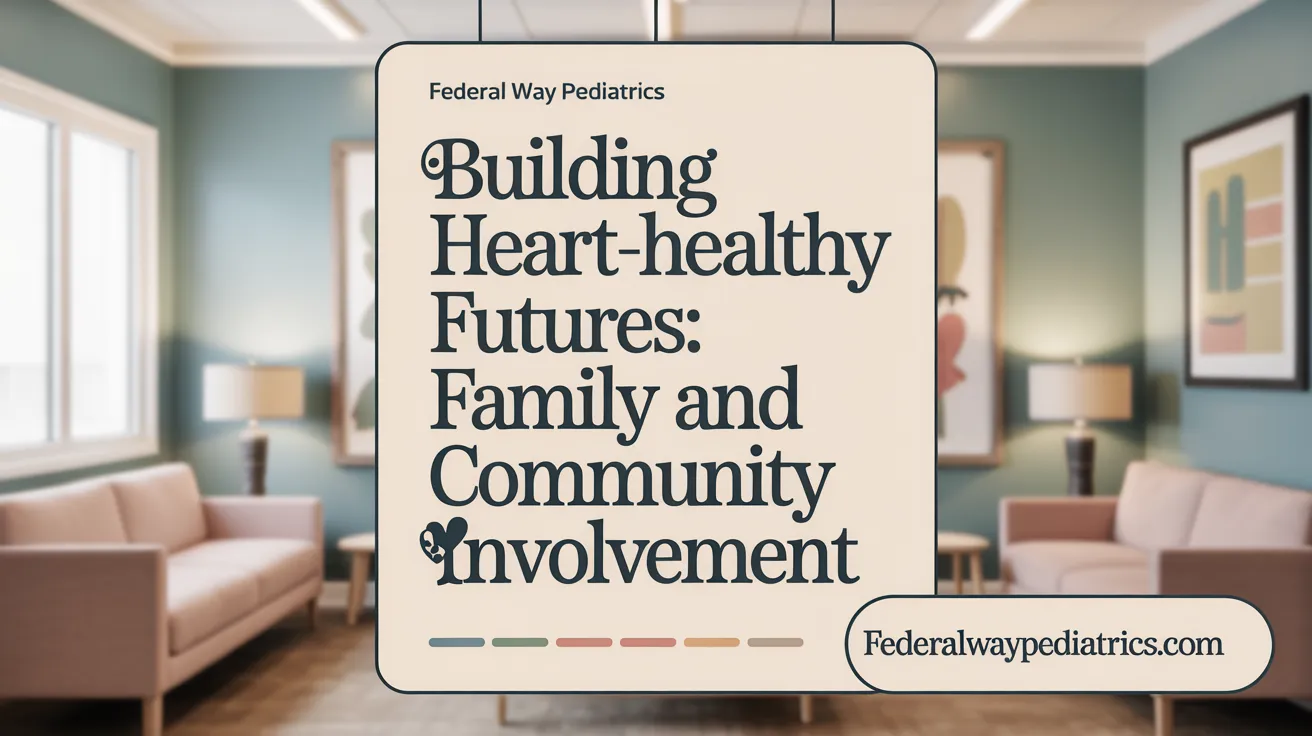
Nutrition and Diet
A heart-healthy lifestyle for children starts with nutritious eating habits. Families are encouraged to include a variety of fruits and vegetables, whole grains, lean proteins like chicken, fish, and tofu, and low-fat dairy products. Involving children in grocery shopping and meal preparation can foster positive attitudes towards these foods. Snacking on vegetables, nuts, Greek yogurt, and dried fruit supports heart health and avoids processed food pitfalls. For more information, see Heart-healthy habits for kids and heart health in children.
Physical Activity Guidelines
Children and teens should aim for at least one hour of moderate to vigorous physical activity each day. Fun, family-oriented activities such as biking, swimming, walking, and outdoor play help build cardiovascular strength and are more likely to be sustained. For younger children, age-appropriate playtime, like tummy time for infants and active play for toddlers, form the foundation for lifelong health. See 10 Ways to Keep Your Child's Heart Healthy and heart health for children and teens.
Screen Time and Lifestyle Modifications
Limiting recreational screen time to two hours or less daily reduces sedentary behavior and encourages more dynamic activities. Parents can help by setting screen-free times and engaging children in games and activities that promote movement. Additionally, managing salt intake by avoiding excess processed foods helps maintain healthy blood pressure in children. For further details, refer to the American Heart Association on children's heart health.
Parental Involvement and Education
Parents play a crucial role by modeling healthy behaviors and setting achievable goals that promote gradual lifestyle changes. Scheduling regular pediatric checkups ensures early identification of potential heart concerns. Open communication about risks such as smoking and vaping is essential, especially for teens. Parental advocacy in schools and community settings fosters environments that support children's heart health. Relevant resources include Protect Your Child's Heart Health and heart-healthy habits for kids.
Local Health Initiatives in Federal Way
In Federal Way, Washington, numerous programs and clinics such as the Mary Bridge Children’s Hospital's pediatric cardiology department and South Sound Cardiology Clinics collaborate to provide comprehensive cardiac care and outreach. These services emphasize early detection, education, and support for families. Community clinics and health education programs work to increase awareness and accessibility of heart-healthy resources, enhancing family and community engagement in protecting children's cardiovascular well-being. Additional information can be found at Seattle Children's Heart Center clinics and Mary Bridge Children's Cardiology.
Advances and Innovations in Pediatric Cardiology
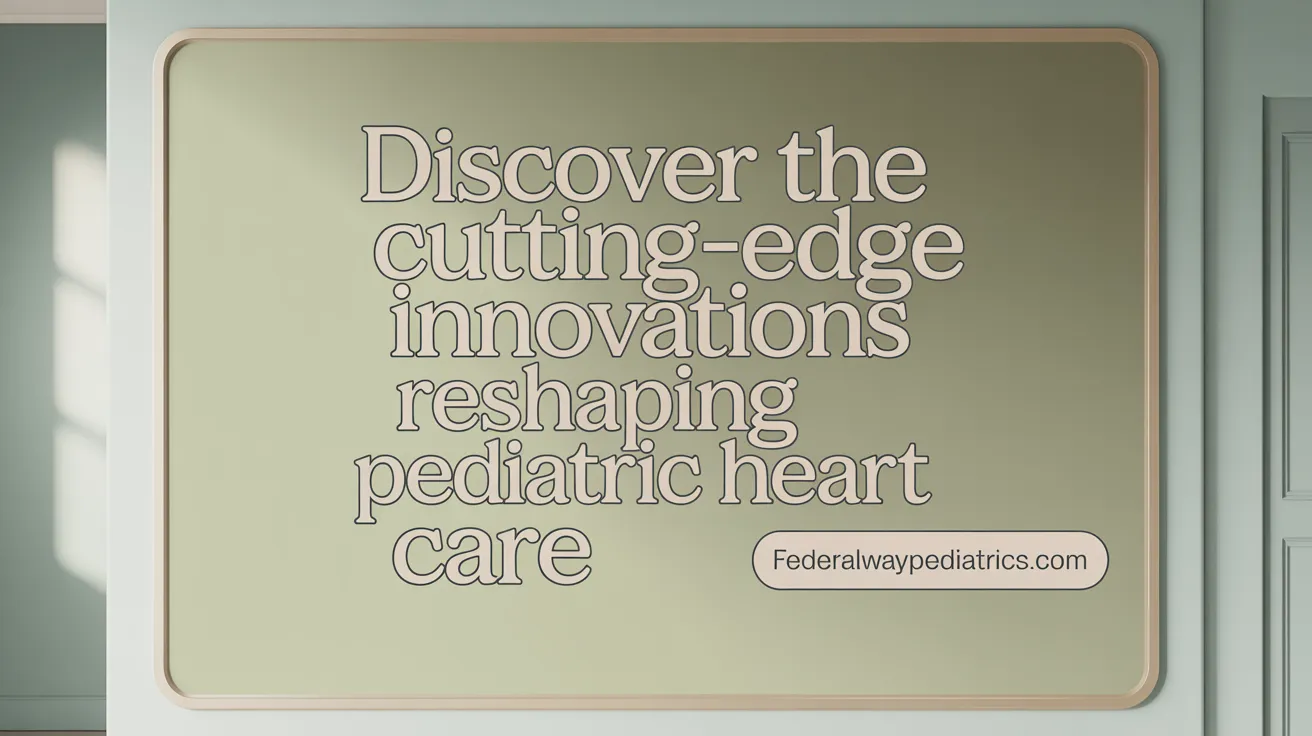
What are the recent innovations improving pediatric heart care?
Pediatric cardiology has seen remarkable advancements that are transforming care and outcomes for children with heart conditions. One major development is the expanded use of minimally invasive procedures, including catheter-based interventions and hybrid surgeries that combine catheterization with surgery, reducing the need for open-heart procedures, leading to shorter recovery times and less trauma for young patients.
How has fetal diagnosis evolved to benefit treatment?
Fetal diagnosis now enables detection of congenital heart defects as early as 14 weeks gestation. Enhanced imaging technologies such as fetal echocardiography during pregnancy from specialized centers allow early intervention planning and better preparation for appropriate treatment immediately after birth or even fetal cardiac interventions in rare cases, improving survival and long-term outcomes.
What role do ventricular assist devices (VADs) play in current treatment?
Innovations in ventricular assist devices (VADs) have revolutionized care for children with severe heart failure. These devices support heart function and have enabled earlier hospital discharge, allowing children to receive advanced care at home. Accompanied by enhanced family education and comprehensive support, they improve quality of life and survival.
How is data shaping personalized care?
The integration of big data—including electronic health records, genetic information, and physiological monitoring—is enabling more personalized care using big data in pediatric cardiology approaches. By analyzing patient-specific data, cardiologists can tailor treatment plans to individual needs, optimize medication regimens, and anticipate complications, representing a new era in pediatric heart care.
Are survival rates improving?
Thanks to multidisciplinary programs and technological breakthroughs, survival rates for children with complex congenital heart conditions have dramatically improved. Nationwide mortality rates have fallen below 5% for many heart defects, and specialized centers report survival rates surpassing national averages, including heart transplant three-year survival rates above 90%. This progress reflects expert surgical care, advanced medical therapies, and lifelong comprehensive management (Seattle Children's Heart Center).
These advances collectively mark a positive shift towards safer, more effective, and family-centered pediatric cardiology treatment.
Accessing Pediatric Cardiology Services Locally and Regionally
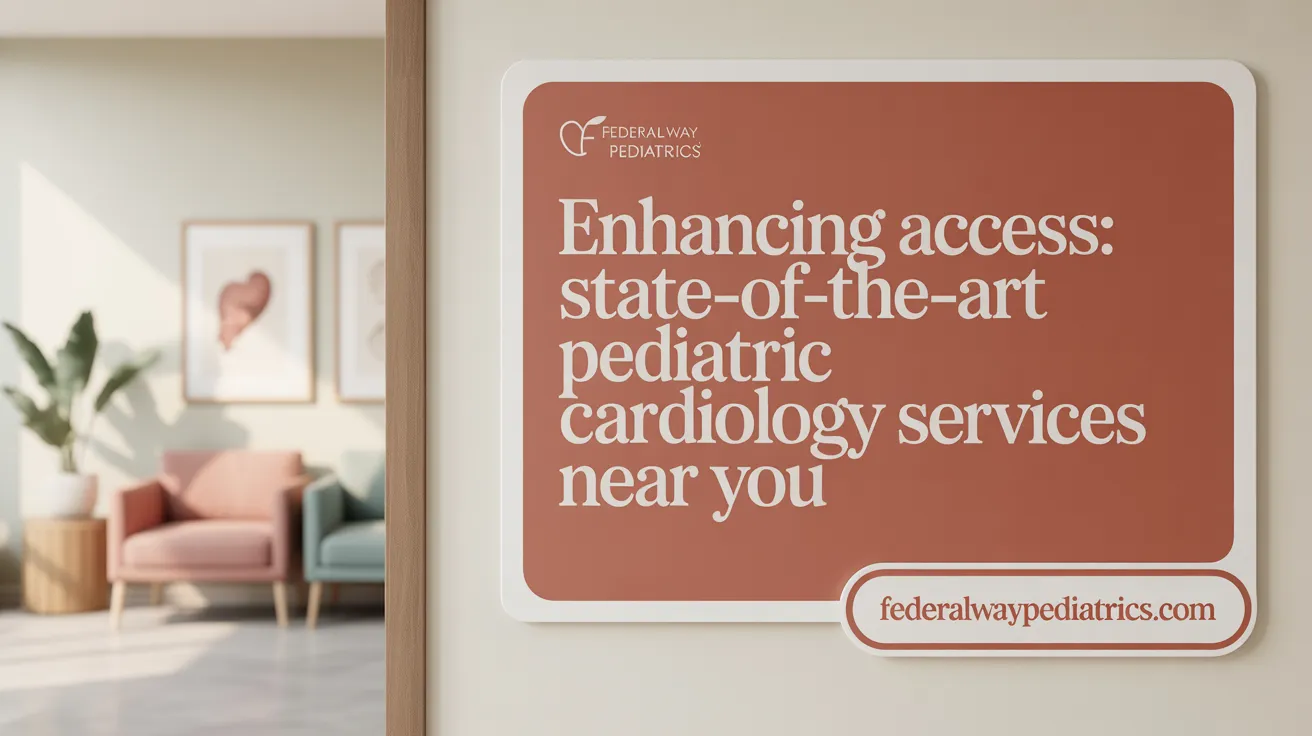
What Pediatric Cardiology Services Are Available in Federal Way and Nearby Regions?
Federal Way, Washington, hosts specialized pediatric cardiology services through institutions such as Mary Bridge Children’s Hospital pediatric heart care and Seattle Children's Heart Center clinics. Mary Bridge Children’s newly established cardiology clinic in Federal Way provides comprehensive care for children with congenital and acquired heart conditions. Their multidisciplinary team, including experienced pediatric cardiologists like Dr. Nefthi Sandeep and Dr. John McCloskey, offers patient-centered care from infancy through young adulthood.
Seattle Children’s Heart Center extends its care across the Pacific Northwest with a regional clinic in Federal Way, enhancing accessibility to expert pediatric cardiac evaluations and treatments closer to home. This arrangement supports high-quality care, including fetal echocardiography during pregnancy and rhythm management, within community settings.
How Do Hospitals and Specialists Collaborate to Provide Comprehensive Care?
Hospitals and pediatric cardiology specialists in the region collaborate closely to deliver a continuum of care. Mary Bridge partners with pediatric cardiac surgeons and independent cardiology groups to ensure comprehensive treatment, including advanced surgeries and urgent care. Similarly, Seattle Children’s Heart Center works alongside the University of Washington (UW) Medicine Cardiology Division for seamless patient transitions, especially for adult congenital heart disease patients.
Such collaborations leverage specialized expertise while facilitating family-centered care approaches that integrate diagnostics, surgery, medication, and long-term follow-up.
What Role Does Community Outreach and Telemedicine Play?
Community outreach is integral to increasing access to pediatric cardiology, especially in rural and remote areas of Northern British Columbia and Washington. Seattle Children’s outreach teams—comprising cardiologists, nurse clinicians, and echocardiographers—conduct clinics in rural communities to bring essential cardiac care closer to families.
Additionally, telemedicine and remote consultations are increasingly used to support ongoing care, enabling timely assessments and follow-ups without requiring frequent travel to tertiary centers. These approaches contribute to maintaining consistent monitoring and early intervention.
Why Are Routine Checkups and Ongoing Monitoring Important?
Routine pediatric cardiology checkups are vital for early detection of pediatric cardiology issues. Initial appointments typically include detailed physical assessments supplemented by diagnostic tests such as ECGs, echocardiograms, and exercise stress tests. Regular monitoring ensures timely adjustments to treatment plans, supports growth and development, and helps detect complications early.
Families are encouraged to maintain scheduled visits as part of holistic heart health management, often coordinated by pediatric cardiologists working in tandem with primary care providers. This continuous care model is crucial for improving outcomes and supporting the child’s quality of life.
| Service Location | Key Features | Benefit to Families |
|---|---|---|
| Mary Bridge Children’s Hospital (Federal Way, Tacoma) | Comprehensive inpatient/outpatient care; family-centered approach | Local access to experienced cardiology and surgical teams |
| Seattle Children’s Heart Center Regional Clinics (Federal Way) | Prenatal to young adult care; advanced diagnostics | Accessible specialized care and outreach in community settings |
| Community Outreach Programs | Mobile clinics, telemedicine support | Expands access to remote/rural families |
| Collaborative Networks | Multidisciplinary teams involving cardiologists, surgeons, nurses | Integrated, coordinated care for complex conditions |
Empowering Families and Communities for Lifelong Heart Health
Comprehensive Pediatric Cardiology Care
Pediatric cardiology specialists provide expert diagnosis and treatment for a wide range of heart conditions in children, from congenital defects to acquired diseases. Care begins prenatally with fetal diagnosis and continues through childhood into young adulthood. Advanced diagnostic tools like echocardiography, cardiac MRI, and genetic testing enable early and accurate detection, facilitating timely interventions that improve outcomes.
Importance of Lifelong Management and Healthy Habits
Chronic heart conditions in children often require continuous monitoring, medications, or surgical interventions. Family-centered care approaches emphasize the value of regular checkups and ongoing collaboration with multidisciplinary teams to manage complex cardiac issues effectively. Equally critical is the adoption of heart-healthy habits from early childhood—such as balanced nutrition, daily physical activity, limiting screen time, and proper sleep—that support cardiovascular health and reduce future risks.
Proactive Family and Community Engagement
Parents and caregivers play a vital role in recognizing early symptoms like fatigue, breathing difficulties, or poor growth, and seeking prompt medical evaluation. Encouraging physical activities and healthy eating as a family helps instill lifelong wellness habits. Community clinics and outreach programs expand access to specialized care, providing local resources and support to families. Together, proactive involvement by families and healthcare providers fosters successful heart health outcomes and quality of life for children living with heart conditions.
